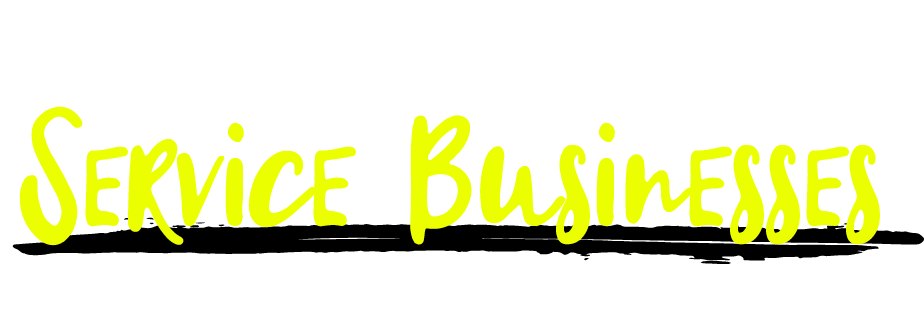Creatives, Coaches And Consultants:
The Key Differences Between Different Types of

By Maggie Patterson
All opinions in this post are my opinions and mine alone.
Want to know something that really gets me fired up? It’s when all types of service businesses are treated as the same. The needs and nuances of creatives, coaches and consultants vary wildly, yet they’re all given the same strategies and BS advice.
In this episode, we’re going to look at the key differences between various types of service businesses.
Listen Now To This Essay On The BS-Free Service Business Show
Let’s start with defining the three main types of services businesses: creative, coaching, and consulting. It’s important to know that while there are other types of service businesses, these are the most common ones you see in the B2B and B2E industries.
While I have experience in B2C services, it’s definitely beyond the scope of my current business and practice, so we’ll stick to these three.
Creative businesses are pretty clear-cut as they’re offering well, creative services. These are services like copywriting, design, development, illustration, branding and so on.
Coaching businesses are built around one-to-one coaching for everything you can think of from money to business to sales to executive leadership.
Consulting businesses offer both strategy and execution related to management, operations, marketing, IT, tech and more. Personally, I consider most professional service providers like lawyers and accountants as consulting businesses.
When you start to think about each type of service business including what they do, how they do it, and what they deliver, you can quickly see how advice for one business may not fit for another.
To be clear, I personally work with all three of these types of services businesses because I have actual experience with all three, and I provide one-to-one support. A broad strategy that may work for a consultant may need to be different for a coach, and what I recommend for a creative business would vary too.
That combination of experience along with my ability to individualize my recommendations ensures that everyone has the right strategy and tactics not just for their type of business, but their personal needs. (And that’s what’s missing from so many of these large programs as you’re literally a number and getting advice from some random success coach who’s never run a service business).

By considering the main differences between each type of business, my goal is to help you ensure you’re getting the RIGHT type of guidance for your specific business.
Deliverables
The biggest difference between coaching vs. consulting and creative work is around what the client “gets” from it. With coaching, there aren’t any tangible deliverables, and it’s about the time you get from your coach.
With both consulting and creative services, you’re typically dealing with a situation where deliverables are involved. For creatives, that may be a specific strategy or an actual piece of creative work. For consultants, that deliverable may be everything from a strategic plan to a training session to executing on a set of tactics.
This is one of the big places where coaches selling to consultants and creatives go sideways. If you don’t deeply understand the type of work being done and the nature of deliverables it’s easy to propose solutions like better boundaries or pushing back with little understanding that the deliverables are what the client is actually paying for.
It’s also a big reason I’ve seen so many coaches encourage creatives and consultants to become coaches. For example, they don’t understand how to price that type of work, but they do understand how to price coaching so they see that as the more lucrative option.
Strategy
A fundamental difference between all three of these types of service businesses is strategy. I recently had a conversation with a coach about how to sell strategy. As a coach, the strategy is more about your method and process, vs. packaging it up into let’s do a strategy session unless you have a very defined coaching niche.
On the flip side, a lot of creatives do strategic work, but they fail to get paid for the strategic thinking that’s required for the creative process. This is really easy to miss as it’s just part of the work you do, and you don’t think to call it out. The result is that your client just thinks you magically execute things and they go to someone else for strategy work.
Hands down, consultants tend to do the best at selling strategy as it’s often expected as part of the work they do. They often start their work with strategic planning initiatives and that flows into execution.
Marketing
Honestly, for all three types of service business owners, marketing should be driven by who your target audience is. Ask yourself where your clients are hanging out before you jump into a hot new platform or try out a new tactic. If your potential clients aren’t there, you’re likely wasting your time.
A great example of this is Instagram. One agency owner I work with has generated leads from the platform because of the type of B2C brands she works with. In another case, I had a client who was focusing all her marketing efforts on Instagram based on advice from a coach, but her target clients were generally on LinkedIn.
Another consideration for marketing is the personal brand debate. Based on my personal experience, I’ve had to build a much bigger brand for my coaching business in the B2E industry than I ever have needed to for creative/consulting work.
If you’re a coach, your brand matters immensely and needs to be a cornerstone of your marketing strategy. You’re more likely to need to use one-to-many marketing including social media, email marketing and content creation.
As a creative or consultant, you’re more likely to be able to market your business purely on one-to-one marketing methods such as referrals, connections, and collaborations. One-to-many marketing will absolutely work for your business, but for many of you, it will be a supplement to your other efforts.
Sales
One of the biggest places where creatives, coaches, and consultants are different is when it comes to sales.
The sales process itself varies for each one starting with that initial phone call. Coaches often do a discovery call that’s one part talking about working together, and one part mini-coaching session. It’s the Costco sample of coaching where you can figure out if it’s a good fit.
This type of sales call is something that I do not recommend whatsoever for creatives or consultants, as there’s a tendency for them to start giving away strategic thinking and ideas for free. Instead, a consult call should be an initial introduction to discuss your process and how you work together.
Next, there’s the “how” of people buying. For coaches, it’s easy to sell something from a sales page. For creatives or consultants, you may need more robust sales support in the form of a proposal.
The reality is that not every type of service should be sold from a sales page, especially if any customization is required. If you’re successfully selling from a sales page right now, stick with it. But if you’re struggling as a creative or consultant, consider using a proposal.
A final difference in the sales process that’s worth noting is the time to get a yes from the client. For coaching, this can be a relatively quick decision, while for creatives and consultants, that process can be much longer. A good guideline is that the more complex or custom service is the longer you may have to wait for a yes.
Money
No discussion of these differences would be complete without a quick discussion of the money side of these businesses.
With all three of these types of businesses, payments may be one-time or recurring on a monthly basis. However, as a creative or consultant, you’re likely dealing with invoices while coaches provide a link to make a payment.
This is one area where coaches have it right as they tend to require clients to pre-pay for their services. This has been one of the biggest things I’ve borrowed for my services as a consultant and creative. I’ve shifted from receiving payment after work was delivered to requiring up-front payment. So while I do invoice clients, payment is due in order for them to start work.
Finally, when it comes to money I’m going to avoid making any sweeping generalizations about how any one type of service business can make the most money and is THE ticket to reaching your goals.
The reality is that creatives, coaches, and consultants all have a viable, proven business model. With the right offer, marketing and sales each one of them can be a path to building a sustainable service business.
That's why it’s so critical that you know the differences between these types of businesses, as you can easily get derailed by advice that’s not really right for your business.
When that happens, you’re not just spending money on coaching or a program but you’re literally messing with your ability to make money too. Plus you’re wasting time and likely going to end up frustrated.

I want this episode to be super actionable for you, as these offers are really appealing. They make big promises about helping you make more and work less, avoid burnout and so much more. Hell, sometimes I see them and think I might need to buy them!
To help you ensure you’re investing your time, energy and money in the right place for you, slow down and ask these questions:
- Do they have specific experience working with your type of services business as a creative, coach or consultant?
- Have they worked offering the same type of services you do?
- When did they last work with clients one-to-one? Do they still work with clients one-on-one?
- Do they market and sell the offer to all types of service businesses?
- Do they have proven experience with your industry? (Especially important if you target corporate clients as most of these offers are B2E).
- Do they preach a one-size-fits-all method for service business owners?
- Do they use income claims or use high-pressure sales tactics?
- Do you get one-to-one support? If so, from who and does that person have hands-on experience running your type of business?
Asking the right questions will help you discern if this is the right move for you or if you’re simply being sucked into the hype. Most of all, you know best what your business needs, so take the time to figure out if it’s a fit for you as a creative, coach or consultant as not all service businesses have the same needs.

